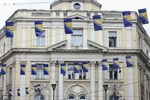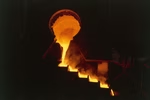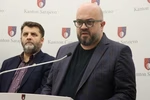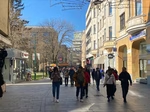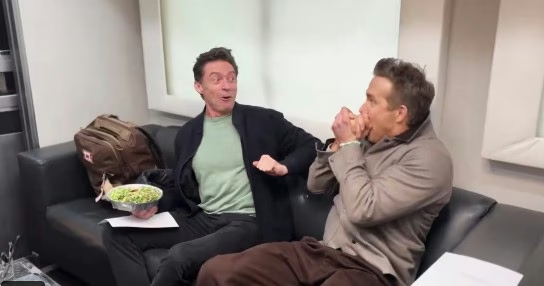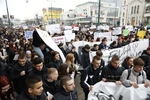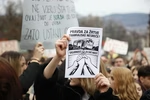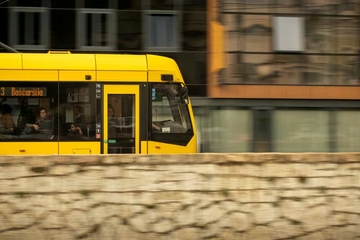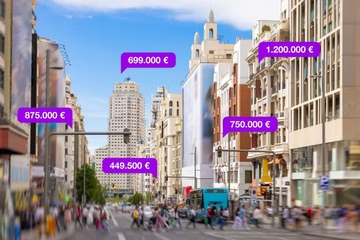
Our peace is fragile, and we should preserve it, but it would not be difficult to start a conflict in Bosnia, the leader of the main Bosniak party in the country, the Democratic Action Party (SDA), Bakir Izetbegovic said in an interview with TV Igman.
"I think that chances for threatening Bosnia's territorial integrity via referendum or the Republika Srpska entity's secession are slim. It'd be an adventure which would cost those who'd initiate such a thing, dearly," Izetbegovic said. "Threatening the agreement which brought stability to the Balkans after everything we've been through would be a grave adventure, and I don't think there are those who'd be ready for such a thing."
Over the past years, the strongest Bosnian-Serb nationalist party, the Alliance of Independent Social Democrats and their leader Milorad Dodik have been threatening with holding a referendum on the secession of Bosnia's Serb-dominated semi-autonomous entity of Republika Srpska and its accession to Serbia.
This caused reactions from local and international officials warning against it, and the consequences it would lead to.
But nothing is 100 percent certain, he said, adding that one should always be ready for the worst.
"The people who suffered two great slaughters in the past 100 years, and several smaller ones shouldn't allow itself to go through a third one. We should build our strength, be a sporting nation capable of defending itself from individuals, families and groups of people – all in line with the Constitution and law. We must learn from Israel," he stressed.
Izetbegovic, who is also the Speaker of Bosnia's House of Peoples, added that this must be done legally, without forming any para systems, but through the strengthening of police and domestic arms industry.
Speaking about the appointment of new ambassadors and consuls in the country, primarily those from Croatia and Serbia, and the establishment of new consulates of neighbouring countries in Bosnian cities, the Bosniak leader said that Bosniaks would be careful the next time they decide on their letters of credence.
"When we talk about ambassadors and consuls – their mandates will pass. This time, some people from the judiciary have protected some consuls, but they can't protect them from the ends of their mandates, and next time, no one working against the interest of our country will hand over their letters of credence," he noted.
According to him, it is an open secret that all embassies in the country are collecting data.
"To undermine the country, to do some subversive activities, that is unacceptable, and we must be careful to whom we will allow to be an ambassador in our country, in the future," he emphasised.
Then Izetbegovic asked why the need for so many consulates.
"We'll have our own consulates. Mr Sefik Dzaferovic (the incumbent Bosniak member of the tripartite Presidency from the SDA) is already in Croatia and Serbia," he said.
He told Igman TV that Bosnia would first open its consulate in Serbia's Sandzak region, and then probably in Croatian cities of Rijeka, and Split, thus balancing the situation.
"We don't intend to spy on them, but it will be part of our response. If we get rejected, we won't issue permits for their people, and we will read their biographies thoroughly in the future," Izetbegovic concluded.
The Speaker of the State House of Peoples touched upon the alleged corruption scandal affecting the top judicial institution in the country, the High Judicial and Prosecutorial Council (HJPC) which appoints and disciplines Bosnia's judges and prosecutors, and its President – Milan Tegeltija, saying that Tegeltija should never have allowed himself to be in a situation commenting or intervening in some cases by other prosecutors because that is illegal in itself.
"Whether someone offered or took some money – that remains o be proven, but the affair itself is enough to disqualify him – and that's something he should never have allowedhimsel," Izetbegovic said.
Last month, an investigative media outlet Zurnal published a video allegedly showing a an entrepreneur from the Northern-Bosnian town of Velika Kladusa, giving some €1,000 to a State police officer, who would then supposedly transfer that money to Milan Tegeltija so that he would look into his case and speed it up, because it was reportedly inactive for years, and costing the entrepreneur from Velika Kladusa a lot of money.
Immediately after the publication, Tegeltija denied all allegations and said he would sue Zurnal for slander.
The prosecution also formed the case and interrogated the entrepreneur and Tegeltija as witnesses in the case. The investigation against the said police officer is also ongoing, and he was suspended pending the investigation.
Kakvo je tvoje mišljenje o ovome?
Učestvuj u diskusiji ili pročitaj komentare





 Srbija
Srbija
 Hrvatska
Hrvatska
 Slovenija
Slovenija










